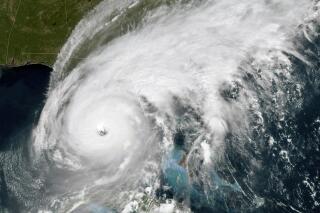Misleading claims downplay climate change’s effect on hurricanes

This GOES-East GeoColor satellite image taken at 12:01 a.m. EDT on Wednesday, Sept. 28, 2022, and provided by the National Oceanic and Atmospheric Administration (NOAA), shows the eye of Hurricane Ian approaching the southwest coast of Florida. On Thursday, Oct. 6, The Associated Press reported on misleading claims suggesting that climate change isn’t real because hurricanes in Florida and across the U.S. haven’t increased in frequency, intensity or landfall in more than a century. (NOAA via AP)
CLAIM: Climate change isn’t real because hurricanes in Florida and across the U.S. haven’t increased in frequency, intensity or landfall in more than a century.
AP’S ASSESSMENT: Missing context. While studies have found no evidence of an increase in hurricane landfalls in the past century in Florida and across the U.S., experts say this data doesn’t disprove the fact that climate change is a real phenomenon impacting hurricanes in other ways. Globally, the intensity of tropical cyclones has been increasing, and studies project that trend will continue, even as the frequency of the storms is expected to remain steady or decrease.
THE FACTS: Following the devastation wrought by Hurricane Ian in southwest Florida last week, some social media users are citing U.S. data that shows hurricanes haven’t become more frequent or intense to misleadingly assert that climate change is not impacting storm behavior.
“No trend in landfalling Florida hurricanes since 1903. Not in frequency. Not in intensity. Not in anything,” wrote a user on Twitter. “Climate is a hoax.”
The post, which has been liked or shared more than 3,700 times as of Thursday, includes a scatter plot map of major landfalling hurricanes in Florida since 1903 and their corresponding wind speeds to suggest there’s been no significant trend in intensity or frequency of the storms.
Another Twitter user cited data showing there were 19 hurricanes that made landfall in the U.S. between 2011 and 2020 — the same number as there were between 1851 and 1860.
“‘Climate change,’ right?” asked a suggestive caption on the post, which had been liked or shared nearly 30,000 times as of Thursday.
Those making the point cite a National Oceanic and Atmospheric Administration web pagethat compiles and analyzes research on climate change and hurricanes, including a 2011 study that found no strong evidence that more hurricanes had made landfall in the U.S. in the last century.
“We conclude that the historical Atlantic hurricane data at this stage do not provide compelling evidence for a substantial greenhouse warming-induced century-scale increase in: frequency of tropical storms, hurricanes, or major hurricanes, or in the proportion of hurricanes that become major hurricanes,” the federal agency wrote, after explaining the study and other research.
But David Zierden, Florida’s state climatologist based at the Center for Ocean-Atmospheric Prediction Studies at Florida State University, cautioned against “cherry-picking” statistics for hurricanes in Florida or the Atlantic Ocean basin.
After all, hurricanes, which are known as tropical cyclones elsewhere, occur worldwide and most of them stay out at sea and never reach the coast, he and other experts said.
“There are many published studies showing increase in strength of the strongest hurricanes, increased rainfall from landfalling tropical systems, increased potential for strong hurricanes, increase in the occurrence of rapid intensification and worsening storm surge with the contribution of sea level rise,” Zierden wrote in an email.
Indeed, the United Nations’ Intergovernmental Panel on Climate Change concluded last year that, globally, the proportion of major tropical cyclone occurrence -- those at Category 3 or higher -- has increased over the last four decades.
Tropical cyclones are also projected to increase in intensity in the future, even as the frequency of the storms is expected to decrease, according to a 2020 study published in the Bulletin of the American Meteorological Society. In both cases, global warming due to increased greenhouse gas concentrations is a driving force, the study suggests.
Other studies have found that human-caused climate change is behind increasingly wetter hurricanes that can put coastal communities at greater risk of flood damage.
Tom Knutson, a senior scientist at NOAA who studies climate change and hurricanes and authored the agency’s web page on the matter, stressed that hurricane data isn’t the most conclusive proof of climate change, either.
In fact, older records on hurricanes — ones collected before the advent of satellites in the 1960s — have limitations since they were largely drawn from data collected by ships out at sea, he said.
Gabriel Vecchi, a Princeton professor of geosciences who studies hurricanes, agreed, saying it was a “non-sequitur” to conclude climate change isn’t real simply because hurricanes aren’t making landfall in the U.S. more frequently.
“Climate change is very real, and evident in the concentrations of CO2 in the atmosphere, global average temperature of the planet, the heat content of the oceans, sea level rise, melting land ice, among many other factors,” he wrote in an email.
Jacob Carstens, a meteorologist and hurricane researcher at Penn State University, said research into the links between hurricanes and climate change is in its early stages, and it’s likely “more signals will emerge” with more reliable data.
“Warmer oceans provide more fuel for hurricanes, which can raise the ceiling on how intense they can get,” he said by email. “Climate change may not be the reason that a particular storm forms, but it can and does amplify a storm’s impacts.”
___
This is part of AP’s effort to address widely shared misinformation, including work with outside companies and organizations to add factual context to misleading content that is circulating online. Learn more about fact-checking at AP.
